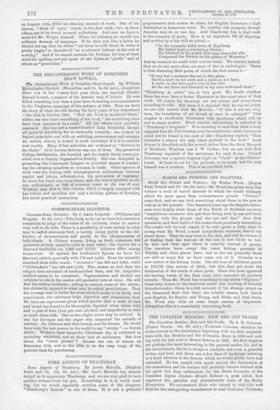COMMON-SENSE DIETETICS.
Common-Sense Dietetics. By C. Leads Leipoldt. (Williams and Norgate. 2s. 6d. not.)—This book, so far as we have felt ourselves competent to judge of the value of its contents, seems to answer very well to its title. There is a possibility of vast variety in what may be called necessary food, a variety owing partly to the dif- ference of circumstances and partly to the idiosyncrasies of individuals. A Chinese woman, living on fruit, consumes 24,2 grammes of food, equal to 1,300 in heat value ; the figures for a Harvard footballer are 1,396 and 10,700. Athletes differ among themselves. As against the footballer's figures we have the Harvard athlete generally with 778 and 4,500. Even the scientific standard diets differ much: " Atwater's " has 800 and 4,060, while " Chittendon's " has 338 and 1,500. This makes us fool that the subject does not admit of hard-and-fast lines, and Dr. Leipoldt's method seems to be consistent. Vegetarianism and alcohol are subjects to which the reader will probably turn at once. He will find the author moderate; willing to concede some of the claims, but distinctly opposed to what may be called prohibitions. That the average man is better for some alcohol seems to be fairly well established; the substance helps digestion and economizes food. We have an experiment given which proves that a meal of ham and bread was found to be thoroughly digested when taken with half a pint of beer (four per cont. alcohol) and imperfectly so with as much skim-milk. One or two slight errors may be noticed. It was the haruspem not the augur who inspected the entrails of animals. Dr. Johnson said that brandy was for heroes. He would have been the last person in the world to say "whisky "—a Scotch drink I Walker's ideal dinner for Christmas day is criticised as including whitebait, not at their best at midwinter. But how about the "reset grouse" P Grouse are out of season on December 11th, and so the 25th is on the very verge of the possible time for purchasing.






















































 Previous page
Previous page